Peptide amide bonds - Study guides, Class notes & Summaries
Looking for the best study guides, study notes and summaries about Peptide amide bonds? On this page you'll find 161 study documents about Peptide amide bonds.
Page 4 out of 161 results
Sort by

-
hesi a2 Exam Questions with Verified Answers | Certified Quality| Grade A+
- Exam (elaborations) • 12 pages • 2024
- Available in package deal
-
- $11.49
- + learn more
hesi a2 Exam Questions with Verified Answers | Certified Quality| Grade A+ carbs to glucose oxidation monosaccharide simple sugar with 1 c per h2o monomer small molecule that forms chemical bonds with other momomers polymer compounds or repeating monomers lipid bonds c-h purpose of lipids energy storage and structural functions fatty acids chains of reduced carbon at 1 end and carboxylic acid at the other end phospholipids contain phosphate rather than fatty acid glycerides fatty acid...
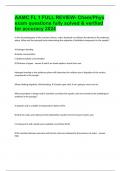
-
AAMC FL 1 FULL REVIEW- Chem/Phys exam questions fully solved & verified for accuracy 2024
- Exam (elaborations) • 24 pages • 2024
- Available in package deal
-
- $14.99
- + learn more
In the chromatography of the reaction mixture, water absorbed on cellulose functioned as the stationary phase. What was the principal factor determining the migration of individual components in the sample? A.Hydrogen bonding B.Solute concentration C.Stationary phase concentration D.Thickness of paper B and D are dumb options. Knock them out. hydrogen bonding to the stationary phase will determine the relative rate of migration of the various components in the sample. When thinking ...
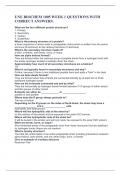
-
UNE BIOCHEM 1005 WEEK 1 QUESTIONS WITH CORRECT ANSWERS.
- Exam (elaborations) • 4 pages • 2023
- Available in package deal
-
- $10.49
- + learn more
UNE BIOCHEM 1005 WEEK 1 QUESTIONS WITH CORRECT ANSWERS. What are the four different protein structures? 1. Primary 2. Secondary 3. Tertiary 4. Quaternary What is the primary structure of a protein? a linear sequence of amino acids in polypeptide chains which is written from the amino terminus (N-terminus) to the carboxyl terminus (C-terminus) What is the secondary structure made of? a-helix, b-sheets, and bends, turns, or loops How are alpha helices formed? They are formed when the ...
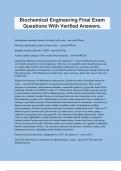
-
Biochemical Engineering Final Exam Questions With Verified Answers.
- Exam (elaborations) • 9 pages • 2024
- Available in package deal
-
- $11.49
- + learn more
Biochemical Engineering Final Exam Questions With Verified Answers. Hydrophobic materials interact favorably with water - answerFalse Neutrons significantly count to atomic mass. - answerTrue Example of polar molecule is H2O - answerTrue Atomic number changes with covalent bond formation. - answerFalse Explain the difference between prokaryotes and eukaryotes? - answerProkaryotes means very simple and primitive microorganisms. They have no organelles other than ribosomes and are single c...
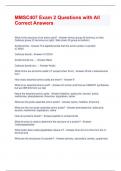
-
MMSC407 Exam 2 Questions with All Correct Answers
- Exam (elaborations) • 12 pages • 2024
- Available in package deal
-
- $9.49
- + learn more
MMSC407 Exam 2 Questions with All Correct Answers What is the structure of an amino acid? - Answer-Amino group (N-terminus on left), Carboxyl group (C-terminus on right), Side chain (R-group on bottom) Amide bonds - Answer-The peptide bonds that link amino acids in a protein (C-NH2) Carboxyl bonds - Answer-C-COOH Amide bonds are... - Answer-Basic Carboxyl bonds are... - Answer-Acidic What forms are all amino acids in? (except when R=H) - Answer-Chiral L-stereoisomer form How many es...
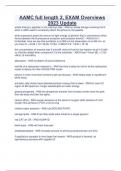
-
AAMC full length 2, EXAM Overviews 2023 Update
- Exam (elaborations) • 43 pages • 2023
- Available in package deal
-
- $15.99
- + learn more
AAMC full length 2, EXAM Overviews 2023 Update amide linking is peptide on the carboxyl side - ANS-so amide linkage involving the N atom in AMC used to covalently attach flurophore to the peptide what expression gives the amount of light energy (J/photon) that is converted to other forms between the fluorescence excitation and emission events? - ANS-E=hf = hc/lambda, here we see that excitation is at 360 nm but observation is at 440 nm. so you have E = (6.62 x 10^-34)(3x 10^8)x (1/360...

-
BIOCHEM MODULE 5 EXAM | QUESTIONS & ANSWERS (VERIFIED) | LATEST UPDATE | GRADED A+
- Exam (elaborations) • 11 pages • 2024
-
- $12.49
- + learn more
1 BIOCHEM MODULE 5 EXAM | QUESTIONS & ANSWERS (VERIFIED) | LATEST UPDATE | GRADED A+ Glycerol contains how many carbon atoms? - 3 - 4 - 5 - 15 Correct Answer: - 3 Which of the following are derived from or made from fatty acids? - Cholesterol - Carotenoids - Phosphoglycerides - Both A and B - Both A and C Correct Answer: - Phosphoglycerides 2 Triacylglycerols are made from a ________ and ________. - glycerol; cholesterol Correct! - glycerol; three fatty acids - cerami...
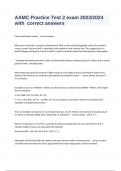
-
AAMC Practice Test 2 exam 2023/2024 with correct answers
- Exam (elaborations) • 26 pages • 2024
-
- $12.49
- + learn more
Chem and Physics section - correct answer What atom is the site of covalent attachment of AMC to the model tetrapeptide used in the studies? - correct answer Because AMC is attached to the peptide on the carboxyl side. This suggests that an amide linkage involving the N atom in AMC is used to covalently attach the fluorophore to the peptide *a peptide bond between amino acids= covalent bond between carboxyl group of 1 amino acid to amino group of other, releasing water What expression give...
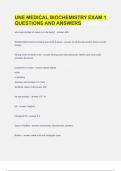
-
UNE MEDICAL BIOCHEMISTRY EXAM 1 QUESTIONS AND ANSWERS.
- Exam (elaborations) • 13 pages • 2023
- Available in package deal
-
- $14.99
- + learn more
what percentage of water is in the body? 60% Relationship between protons and acids & bases Acids donate proton. Bases accept proton Strong Acids Vs Weak Acids Strong acids fully dissociate (100%) and weak acids partially dissociate properties of water dipole dipole polar H bonding dissolves electrolytes ( CL /Na) Small Kd- doesn't dissociate alot kw ion product 10^-14 pH -log[H+] biological PH 7.4 types of buffers phosphates, bicarbo...
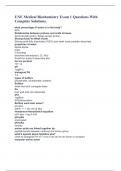
-
UNE Medical Biochemistry Exam 1 Questions With Complete Solutions.
- Exam (elaborations) • 8 pages • 2024
-
- $11.49
- + learn more
UNE Medical Biochemistry Exam 1 Questions With Complete Solutions. what percentage of water is in the body? 60% Relationship between protons and acids & bases Acids donate proton. Bases accept proton Strong Acids Vs Weak Acids Strong acids fully dissociate (100%) and weak acids partially dissociate properties of water dipole dipole polar H bonding dissolves electrolytes ( CL /Na) Small Kd- doesn't dissociate alot kw ion product 10^-14 pH -log[H+] biological PH 7.4 types of ...

How did he do that? By selling his study resources on Stuvia. Try it yourself! Discover all about earning on Stuvia


